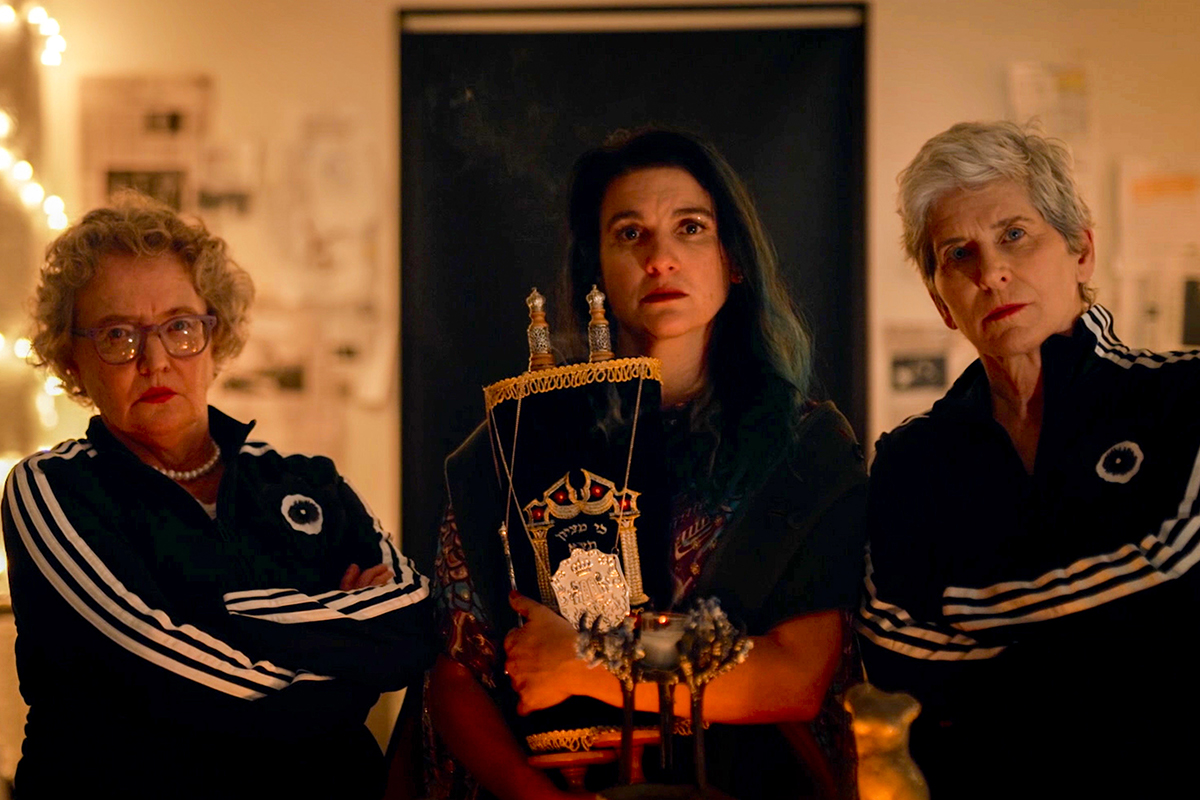When Alicia Jo Rabins was in the final round for a grant to support what would become A Kaddish for Bernie Madoff, her interviewers began to grill her. “What makes you think anyone’s going to be talking about Bernie Madoff in three years when your piece is done?” they asked, wondering if the work she wanted to make — a series of songs and stories about Madoff and his victims — would still feel relevant by the time she finished it.
Rabins told me that she had her answer ready: “Each story contains other stories, and stories have resonance, deeper than the literal content of that one event that happened. They echo through time and they’re connected to other stories, whether they’re ancient stories or moments in our personal, modern life.”
Her argument is powerfully made in the first few minutes of the film, which premieres today through the Portland International Film Festival. In them, Rabins walks through an empty office, wandering through once-busy professional scenes that seem to have been suddenly abandoned. “Have you ever been in a completely empty floor of an office building?” she asks, in voiceover. “The names of cities still on the wall, a blank space above them where clocks once hung. A vast sea of cubicles which once held workers who spent their waking lives here. Floors marked with scuffs from shoes that walked back and forth… There’s something post-apocalyptic about it, like walking through the ruins of a once-great civilization.”
She could, of course, be talking about the Manhattan of the 2020s, abruptly emptied by the COVID pandemic. We’ve seen recent images of neglected office plants and open-floor-plans turned to ghost towns, and read thinkpieces about the gloomy future of Manhattan commercial real estate. But she isn’t — she’s describing 2008, when she won a grant for artists through the Lower Manhattan Cultural Council’s Workspace residency, which gave vacant office space in lower Manhattan to artists for one year.
In their ninth-floor financial district studios, Rabins — who describes herself as a writer, musician, composer, performer, and Torah teacher — and her fellow residents had front-row seats to the Wall Street crash. “It felt like the world was turned upside down as we made art separately, side by side… as the financial world collapsed around us.” When Bernie Madoff was arrested for perpetuating the largest Ponzi scheme in history, Madoff’s Jewishness, and the Jewishness of many of his victims, struck Rabins, who is Jewish herself. “I felt a strong calling to think about what it meant that this person from my own tribe had committed this huge crime.”
Then, Rabins’ mom told her that the Mourner’s Kaddish, a prayer traditionally said for someone who has died, had been recited for Madoff at a synagogue where many of his investors were members. Her obsession with Madoff grew into a drive to speak to his victims, and to modernize this ancient excommunication tradition: to say a kaddish for Madoff while he was still alive, thereby casting him out of the Jewish community.
The project began as a theater piece, which originated in New York at Joe’s Pub in 2012 and further developed after Rabins moved to Portland, Oregon. When she decided to stop touring it, Rabins wanted to document it. She hired someone to film the theater piece, but was brainstorming how to make it more engaging. “Maybe it could start backstage, like a Netflix comedy special. I brought that up to the guy I had hired and he was like, dude, I just document theater.”
So she had to find a director. One of the movie’s recurring themes is a sense of ineffable connection, a mysterious intertwining of all of our lives. The process of putting the film together certainly bears out that theory: She ended up finding her primary collaborator through a case of mistaken email identity. Rabins told me that “I got a very mysterious email. And then I did a little digging and realized that it was actually intended to be for this other Alicia.” That other Alicia turned out to be filmmaker Alicia J. Rose (The Benefits of Gusbandry), another Portland Jew. Rabins passed along the email but thought “it was weird, as an adult, to ask to be friends just because we had almost the same name.” But Kaddish for Bernie Madoff was the perfect excuse. Through their collaboration, they came to call each other A. Jo and A. Ro for clarity’s sake, as they did during our Zoom interview.
Rabins’ music led for Rose, who has a background in music videos: “The music was great. I was really compelled. And I could totally see it coming to life in an actual film version. And when I met A. Jo, I was like, holy shit, it’s like another me. By the end of the hour, the guy she’d [originally] hired was like, I’ll just see myself out.”
That was three years ago, in 2018. The two Alicias spent a year translating the stage script into a screenplay, and then shot the bulk of the film in 2019, cheating Portland for New York (and sometimes Palm Beach). In November of that year, they grabbed a few NYC exteriors, inadvertently capturing some of the final moments of the pre-pandemic city.
The result of that partnership is a feature-length hybrid of docudrama and musical memoir, co-adapted, directed, and edited by Rose and produced by Lara Cuddy.
By the time I saw the film, I didn’t remember much about Madoff and his victims, and I appreciated hearing some of their stories at a time when financial crisis, and the terror of losing everything, feels all too familiar. Rabins tells us in voiceover that Madoff’s scam was an “affinity scheme” — “we trust people who are like us.” Most of his victims were the children of Jewish immigrants who arrived in the U.S., like Madoff’s family, with very little. This contributes to Rabins’ sense of responsibility for his misbehavior, that someone from her tribe, genetically tied to her, could be so evil — and could prey on his own. “When someone from a majority culture commits a crime, we see them as a person. But when they’re from a minority group, there’s a false sense that they represent that culture.”
The Jewish community helped Madoff win the trust of his victims — and it also helped Rabins in her investigation of his world a decade ago. Throughout the film, as her obsession with Madoff grows, she always seems to know somebody who knows somebody who was touched by Madoff: a therapist whose mother was a victim; a poet who’s friends with the lawyer defending those who managed to escape his fund richer than they went in; a Buddhist monk who also happens to be a Jew.
Rabins plays each of the characters she met, reconstructing a minimalist version of their environment and setting their testimonies to music. She inhabits high-powered financial operatives, FBI agents, and victims. (I especially appreciated the costume, and mannerisms, she assigned to the therapist character, simply called “Therapist.”) She also gives the apology letter that Bernie Madoff apparently had slipped under the doors of neighbors in his building the musical treatment.
For all its heavy themes, the film often has a light touch and doesn’t take itself too seriously. It’s full of memorable visuals, some of which grew out of the stage show, and some of which were inventions of the film. Animations by Zak Margolis overlay and intersperse with the footage, which developed out of an animated backdrop that replaced Rabins’ band when she began workshopping the show in Portland. There’s a scene of synchronized swimming in Palm Beach — seeing and hearing a group of women in a pool beat their chests as they recite the Yom Kippur sins isn’t an image you’re likely to find elsewhere.
In another very witchy scene, a group of older women in track suits circle a bubbling, smoking cauldron. “Being able to create sort of a magical realist vibe in certain moments was really powerful,” said Rose. “There are definitely some traditional texts and the kaddish… and then these beautiful, older Jewish women dressed in tracksuits reciting biblical curses, while circling this altar. You know, to me, it’s supposed to be a little bit funny, but it’s also supposed to be like, very intense and real at the same time.”
Rabins grapples with these connections to the ancient Jewish world anew when the source of her whole quest — the story of Madoff’s Palm Beach Kaddish — is called into question. Her mom later says she had no idea what Rabins is talking about. (“There was hugging and crying among the victims, but there was no kaddish for Madoff,” says a group of capped synchronized swimmers in flat-toned unison.) Grasping for the source of the idea in her head, Rabins wonders, “Was it some ancient Jewish memory of excommunication surfacing?”
Her answer seems to ultimately lie in the Kabbalistic connection that she perceives within everything. “Everything is linked with everything else,” she says at one point — which feels apt for this film in so many ways, and reassuring in a pandemic that isolates us from one another. The post-production team for this film certainly managed to feel associated despite all the challenges: for the last year, through COVID, five people in Portland met weekly on Zoom, worked in their home studios, and edited a movie into being.
When Rabins first made this piece, it was a Jewish examination of 2008, and of what many perceived to be the great crisis of our lifetime. But plenty of other crises have arrived since — and Madoff, in some way, foreshadows many of them. Rabins describes his “temptation to give people what they want, tell them what they want to hear, instead of dealing with reality.” She wonders if he was a “mastermind or just a common criminal?” The most explicit the film gets is towards its end, when Rabins recounts how, in the intervening years between 2008 and now, “Bernie Madoff would leave this earth, and another scam artist would rise in his place.” Or, if you prefer it in song: “Is the story new or is it old / or is it different every time it’s told?”
In the end, Rabins does do her version of a kaddish for Madoff, complete with candles and descriptions of medieval shofar blowing. “There is no ritual practice without art and no art without ritual practice,” she tells me. “They’re really intertwined. And I almost don’t believe in the distinction between them.” Rose, whose Judaism wasn’t previously a huge part of her identity, says she feels “more connected to my Jewish self after making the movie, which was a really profound experience for me. More importantly, I’ve met another Jew in Portland.”
A Kaddish for Bernie Madoff premiered at the virtual Portland International Film Festival from March 5-14, 2021. Find out where to stream it next here.



